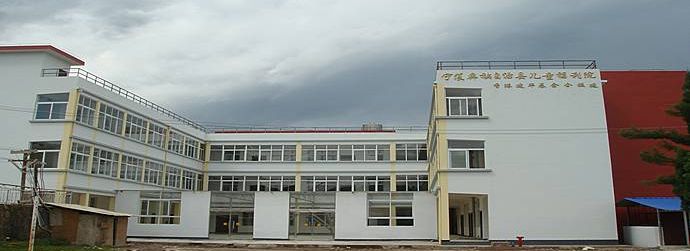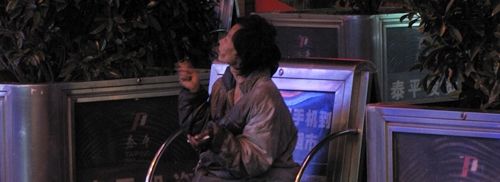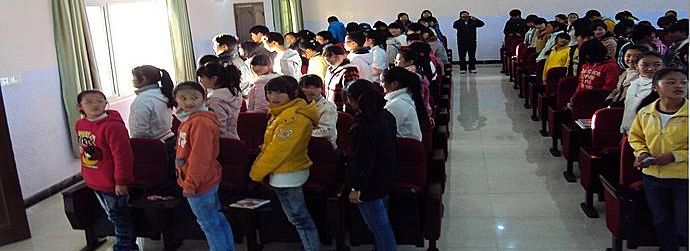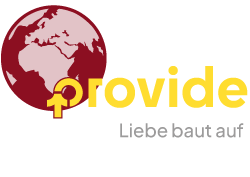New forms of Childrencenters are welcome
March 2016
Our main emphasis right now is on building up Children- and family centers. Local partners and the government have asked us to help establish and run Centers for children - especially needed in village settings. They are supposed to run not only as schools but also as centers for further remidial education of young people. Children and young people can receive special help and support that they cannot get in schools due to lack of time and education their family cannot offer them at home. Especially the new challenges and changes in a rapidly advancing globalization and digitalization in all sectors of society hit particularly hard the rural regions lagging behind in their development. Classical occupations and job opportunities are disappearing rapidly. In some places, work-related mobility turns the social structure completely upside down and leads to phenomena such as drastic overaging, missing parents and abandoned children, the loss of service providers and specialists. The goal of these centers is to help children, young people and their parents to deal with those cultural and economical transformation processes. The focus is especially on the children of the migrant workers, who were left in the villages and their families. In following areas the centers offer help:
- Homework support
- support and promote gifts and abilities
- to set up childrens- and educational sponsorships for families in extreme poverty
- psychological care and therapy for trauma victims
- Home visits and specific cooperation with parents and grandparents
Orphanage work goes online

November of 2015
While our Provide employee was still a young men, going to school in Germany, finishing off high school, on the other part of the world some people had the desire, to get an orphanage set up in China. These people are his colleges now. It was a long process, after many discussions, the government finally gave its approval. One of the officials recalled the beginnings with following words: "there was a foreign lady, who came into my office over and over again, talking about the orphanage project. She came very often and was pretty stubborn, so we didnt have a joyce. We gave her the permit!"
So about 15 years ago the first step was done for the "Rainbow-house of hope" and the first -out of 4 houses - opened its doors. The idea was to have the orphans live in "families" of about 8 to 10 kids with foster parents. Once put together, these "families" stay like together, till the kids are grown up, like in regular families also. This is the only way for the children to learn how a healthy family life is functioning and they can learn for their future, how to become good parents themeselves.
About 30 children from different people groups now had a home. Half of these children today are grown up already and some have families on their own. The first "grandchildren" are born. The other half is during the week living in school dometeries. In many remote areas of our province, schools have been merged into a large boarding school where children learn and live six days a week. On Sunday they are free and can come home for a visit. According to official figures, this measure should improve the education of children and ensure an "adequate upbringing".
For us, this means that we only have the children in the home on Sundays. On one hand, a lot of work falls away for us; on the other hand, it is not easy for us to help the teenagers in all their questions, especially in their decisive years. The focus of the work is therefore shifted to visits to the school and cooperation with the responsible teachers. Due to the spatial separation, the social media via mobile phone become the main conversation channels with the children. For the foster parents, this meant buying smartphones and becoming familiar with the world of social media at the age of almost 70 years. So the children can pour out their hearts during the week by cell phone message, for example, when they are bullied again because they are orphans.
Due to the situation, we have closed the old premises of the orphanage this summer and reduced to a multi-room guest apartment. From here, the work will be coordinated for the remaining years until all children are grown up. The apartment is also a meeting point for the children on weekends, vocation and holidays. Due to their age, 4 out of 5 employees could not get their work visa renewed. They have returned to their home countries Malaysia, Singapore and Finland this August and September. From there the work continues - online. It is the only way for to help the children in boarding schools us in all matters of life. And the children make plenty use of it.
Orphanages in China
Abandoned
Hope for the hopeless
Xiao Bo knocks on the door. His heart pounds wildly, when he hears his mothers voice behind the door: "Xiao Bo, is that you? Go away, go! He will come back soon. Go away and never come back again!" He, that is his mothers new husband. Xiao Bo is a so-called "abandoned" boy. His dad left sometime ago to come his and his families dreams come true of a better, more modernized life. He went to Shanghai on the eastcoast as a migrant worker. At first he still was sending money back to the family, then the contact broke. In order to survive, his wife was forced to remarry. The new husband doesnt want to take care of the children who were left behind. So they are cast out. Should they come back they might get beaten up. These children fall through are not taken care off by any social networks and usually end up on the streets.
One of our goals in the southeast of China is, not only to supply them with clothing, food and a shelter, but also to become mom and dad to them.
You may become part of this work by donating/sending a gift
Project number: P1815
Helpcenter for addicts

2014
The Golden Triangle
The evening shadows of the mountain peaks are laying heavy over the highland valleys in northern Yunnan, a province in southwest China. In the small mountain town the schoolday just finished and the students are on their way home - among them several dozen children from our orphanage. They have to hurry, because the beautiful sunset lasts only a few minutes, until it is swallowed by the darkness of the night. As soon as night sets in, the streets in the tranquil town become uncertain. At dawn, the drug dealers appear on the main street that runs through the place. Especially the students in the upper grades often have lessons until late in the evening and leave the school building after dark. t Our biggest worries for them are, that nothing happens to them and that they do not get in the wrong way on their way home.
Unfortunately hard drugs among young people are very common in these remote mountain regions. For centuries, the locals in the hills know and use opium. The border regions of Myanmar (Burma), Thailand and Laos became sadly known for their fierce trade with drugs, paid by Chinese traders with gold , and is called "The Golden Triangle".
In the provincial capital Kunming, with its 8 million inhabitants, live an estimated 50,000 drug addicts.
About a year ago, our staff in Kunming was asked by friends and local authorities to provide addiction counseling. The idea of a addiction help center was born. The goal is, not only to offer help for those affected, but work especially in schools and universities, to challenge the students in advance, open their eyes to the horrible effects of drugs and thus make the young people aware of the danger.
For the team it stil is shocking how little addicts knew about health implication the drug has on them. As their body decays more and more, the addiction draws them deeper and deeper into an ever-growing swamp of problems. Theft, prostitution and HIV / AIDS are the ugly companions of addiction on the way to the margins of society. Those affected who turned to us for help, have lost everything through their addiction in just a short amount of time: work, friends, family, and finally all hope.
After more than one year of planning, the application for the addiction center has been submitted. If the authorities will give us green light for this project, the first courses could start.
Consultation Center

2014
We don`t want girls to land on the street
Consultation Center
From 2012 to 2014 we were involved in the leadership of 大文 „DaWen / The Bridge“.
Here we present to you the project we are involved in with "Eden Ministry". "Eden Ministry" is taking care of prostitutes and pimps. Several of those people have changed their lives completely and left the business. Many ladies found a good job in the workshops of the project and now earn their living without having to sell their bodies.
Often our team only has about 120 Minutes to talk to 70 students in their classrooms. "A crumpled 50-euro note is still worth 50 euros, even if it doesn`t look new. Likewise, our lives are valuable - no matter what." So we encourage the girls to see their sexuality as a pearl. We teach them that it's okay to say "no". Even if life goes differently and they sometimes feel like this crumpled 50-euro bill, their intrinsic human value has not changed.
